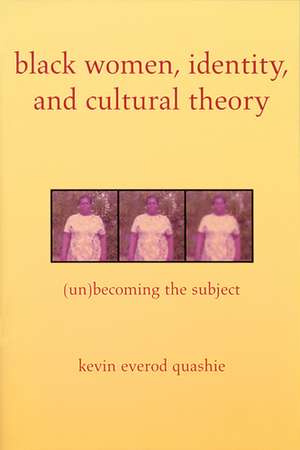Black Women, Identity, and Cultural Theory: (Un)Becoming the Subject
Autor Kevin Quashieen Limba Engleză Paperback – 24 dec 2003 – vârsta ani
In Black Women, Identity, and Cultural Theory, Kevin Everod Quashie explores the metaphor of the “girlfriend” as a new way of understanding three central concepts of cultural studies: self, memory, and language. He considers how the work of writers such as Toni Morrison, Ama Ata Aidoo, Dionne Brand, photographer Lorna Simpson, and many others, inform debates over the concept of identity. Quashie argues that these authors and artists replace the notion of a stable, singular identity with the concept of the self developing in a process both communal and perpetually fluid, a relationship that functions in much the same way that an adult woman negotiates with her girlfriend(s). He suggests that memory itself is corporeal, a literal body that is crucial to the process of becoming. Quashie also explores the problem language poses for the black woman artist and her commitment to a mastery that neither colonizes nor excludes.
The analysis throughout interacts with schools of thought such as psychoanalysis, postmodernism, and post-colonialism, but ultimately moves beyond these to propose a new cultural aesthetic, one that ultimately aims to center black women and their philosophies.
The analysis throughout interacts with schools of thought such as psychoanalysis, postmodernism, and post-colonialism, but ultimately moves beyond these to propose a new cultural aesthetic, one that ultimately aims to center black women and their philosophies.
Preț: 177.86 lei
Preț vechi: 254.09 lei
-30% Nou
Puncte Express: 267
Preț estimativ în valută:
34.04€ • 35.08$ • 28.74£
34.04€ • 35.08$ • 28.74£
Carte indisponibilă temporar
Doresc să fiu notificat când acest titlu va fi disponibil:
Se trimite...
Preluare comenzi: 021 569.72.76
Specificații
ISBN-13: 9780813533674
ISBN-10: 0813533678
Pagini: 246
Ilustrații: 4
Dimensiuni: 152 x 229 x 18 mm
Greutate: 0.31 kg
Ediția:None
Editura: Rutgers University Press
Colecția Rutgers University Press
ISBN-10: 0813533678
Pagini: 246
Ilustrații: 4
Dimensiuni: 152 x 229 x 18 mm
Greutate: 0.31 kg
Ediția:None
Editura: Rutgers University Press
Colecția Rutgers University Press
Notă biografică
KEVIN EVEROD QUASHIE is an assistant professor of Afro-American studies at Smith College. He is the co-editor of New Bones: An Anthology of Contemporary Black Writers in America.
Cuprins
Acknowledgments
Introduction: What Becomes...
Chapter 1 - The Other Dancer as Self: Notes on Girlfriend Selfhood
Chapter 2 - Self(full)ness and the Politics of Community
Chapter 3 - Liminality and Selfhood: Toward Being Enough
Chapter 4 - An Indisputable Memory of Blackness
Chapter 5 - The Practice of a Memory Body
Chapter 6 - Toward a Language Aesthetic
Chapter 7 - My Own, Language
Conclusion... What is Undone
Notes
Works Cited
Index
Introduction: What Becomes...
Chapter 1 - The Other Dancer as Self: Notes on Girlfriend Selfhood
Chapter 2 - Self(full)ness and the Politics of Community
Chapter 3 - Liminality and Selfhood: Toward Being Enough
Chapter 4 - An Indisputable Memory of Blackness
Chapter 5 - The Practice of a Memory Body
Chapter 6 - Toward a Language Aesthetic
Chapter 7 - My Own, Language
Conclusion... What is Undone
Notes
Works Cited
Index
Descriere
In Black Women, Identity, and Cultural Theory, Kevin Everod Quashie explores the metaphor of the “girlfriend” as a new way of understanding three central concepts of cultural studies: self, memory, and language. He considers how the work of writers such as Toni Morrison, Ama Ata Aidoo, Dionne Brand, photographer Lorna Simpson, and many others, inform debates over the concept of identity. Quashie argues that these authors and artists replace the notion of a stable, singular identity with the concept of the self developing in a process both communal and perpetually fluid, a relationship that functions in much the same way that an adult woman negotiates with her girlfriend(s). He suggests that memory itself is corporeal, a literal body that is crucial to the process of becoming. Quashie also explores the problem language poses for the black woman artist and her commitment to a mastery that neither colonizes nor excludes.
